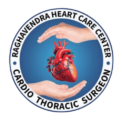Ventricular Septal Defect Closure
Appointment Form

Dr. Raghavendra Murthy
MBBS, MS - General Surgery, MCh - Cardio Thoracic and Vascular Surgeron

Best Ventricular Septal Defect Closure Treatment in Bangalore
Ventricular septal defect closure surgery in Bangalore is a well-regarded treatment for patients with a ventricular septal defect (VSD), commonly known as a “hole in the heart.” This congenital heart defect occurs when an opening develops in the septum, separating the heart’s left and right ventricles. This opening disrupts normal blood flow, often leading to complications if left untreated. In Bangalore, top hospitals and specialized cardiac centers offer advanced ventricular septal defect closure surgery with skilled cardiac specialists, including Dr. Raghavendra Murthy, who provide high-quality care and successful outcomes for patients with complex heart defects.
This surgery is crucial for preventing long-term complications such as heart enlargement, pulmonary issues, and heart failure, particularly in severe VSD cases. Patients seeking ventricular septal defect closure surgery in Bangalore can access comprehensive treatment options designed for both children and adults with VSD. Procedures like VSD closure or ventricular septal defect treatment are personalised to the specific needs of each patient, providing a safe approach to recovery and improved quality of life.
What is Ventricular Septal Defect Closure Surgery?
Ventricular septal defect closure surgery is performed to close the abnormal opening in the septum between the heart’s left and right ventricles. This congenital heart defect disrupts regular blood flow and may lead to symptoms such as rapid breathing, cyanosis, and fatigue. For patients in Bangalore, hospitals provide options such as surgical closure or VSD closure procedure, based on the patient’s age and the severity of the defect.
Symptoms of Ventricular Septal Defect
Patients with a ventricular septal defect (VSD) may experience a range of symptoms, which can vary based on the size and location of the defect. Common ventricular septal defect symptoms include:
- Breathlessness and rapid breathing: Patients often have difficulty breathing, especially during physical activity.
- Poor weight gain in infants: Infants with VSD may struggle to gain weight due to increased energy expenditure from breathing difficulties.
- Frequent respiratory infections: These patients are more susceptible to lung infections.
- Cyanosis or blue-tinged skin: A sign of inadequate oxygen levels in the blood.
Recognizing these symptoms early is crucial for timely intervention. Effective treatment, including ventricular septal defect closure surgery in Bangalore, can significantly improve the patient’s health and quality of life.
Causes of Ventricular Septal Defect Closure
- The exact cause of a ventricular septal defect (VSD) remains unclear.
- Commonly associated with genetic factors.
- May develop during fetal growth as a congenital heart defect.
- Maternal factors such as diabetes or exposure to certain medications during pregnancy can increase the risk of VSD.
- Environmental factors, including exposure to toxins or infections during pregnancy, may also contribute to the development of congenital heart defects.
- A family history of congenital heart defects can elevate the likelihood of a child being born with a ventricular septal defect.
Understanding these causes is essential for creating an effective treatment plan for ventricular septal defect surgery in Bangalore.
Risk Factors of Ventricular Septal Defect
Several risk factors can increase the likelihood of developing VSD:
- The exact cause of a ventricular septal defect (VSD) remains unclear.
- Commonly associated with genetic factors.
- May develop during fetal growth as a congenital heart defect.
- Maternal factors such as diabetes or exposure to certain medications during pregnancy can increase the risk of VSD.
- Environmental factors, including exposure to toxins or infections during pregnancy, may also contribute to the development of congenital heart defects.
- A family history of congenital heart defects can elevate the likelihood of a child being born with a ventricular septal defect.
Complications of Ventricular Septal Defect
Without timely intervention, a ventricular septal defect can lead to severe complications, including:
- Heart failure: Over time, the heart may struggle to pump blood effectively due to increased workload.
- Arrhythmias: Irregular heartbeats can occur as a result of structural heart changes.
- Pulmonary hypertension: Increased blood pressure in the lungs can develop, leading to further heart strain.
Understanding the risk factors for ventricular septal defect (VSD) is crucial for timely diagnosis. Those at risk can greatly benefit from ventricular septal defect closure surgery in Bangalore, which effectively treats the defect and improves heart health.
Prevention of Ventricular Septal Defect
Taking these preventive steps can help identify risks associated with congenital heart defects and enable early detection and planning.
- Manage maternal health during pregnancy to reduce risks.
- Ensure proper prenatal care and screenings.
- Maintain a healthy lifestyle before and during pregnancy, including a balanced diet and avoiding harmful substances.
- Stay informed about family medical history related to congenital heart defects.
- Consult with healthcare providers for personalized care plans.
By implementing these preventive measures, expectant mothers can reduce the risk of ventricular septal defects in their newborns. Early detection and management are crucial for ensuring better outcomes, including the need for ventricular septal defect closure surgery in Bangalore if necessary.
What Conditions are Associated with Ventricular Septal Defect?
Conditions that may accompany a ventricular septal defect (VSD) include:
- Congenital heart failure: A serious condition where the heart cannot pump effectively due to structural defects.
- Atrial septal defect: Another common congenital heart defect involving an opening in the septum between the heart's atria.
- Patent ductus arteriosus: A heart condition where a blood vessel that should close after birth remains open, affecting blood circulation.
These associated conditions highlight the importance of early diagnosis and treatment for VSD. Prompt intervention, such as ventricular septal defect closure surgery in Bangalore, is crucial to improve patient outcomes and prevent complications related to congenital heart defects.
Screening Methods for Ventricular Septal Defect Closure Surgery
Screening for ventricular septal defects involves several diagnostic methods to assess the defect, including:
- Echocardiograms: Imaging techniques used to visualize heart structures and blood flow.
- Fetal echocardiography: A specialized ultrasound used for prenatal diagnosis of congenital heart defects.
- Cardiac MRI: Provides detailed images of the heart, allowing for a comprehensive assessment of the defect.
Diagnosis and Tests
For ventricular septal defect closure surgery, diagnosis typically involves:
- Chest X-rays: To check the size and shape of the heart.
- Electrocardiogram (ECG): Measures the heart's electrical activity and rhythm.
- Echocardiography: An essential tool for visualizing the defect and assessing its impact on heart function.
These assessments are crucial for determining the appropriate treatment plan, including potential ventricular septal defect closure surgery in Bangalore.
Treatment Options for Ventricular Septal Defect Closure Surgery
Ventricular septal defect closure surgery in Bangalore offers various treatment options personalised to individual patient needs:
This method involves making an incision in the chest to access the heart. The surgeon directly repairs the ventricular septal defect (VSD) using sutures or patches, effectively closing the hole and restoring normal blood flow.
For some patients, a less invasive procedure is available. Using a catheter inserted through a blood vessel, a device is deployed to close the defect without the need for open-heart surgery. This method often results in shorter recovery times and minimal scarring.
Until surgery can be performed, patients may be prescribed medications to manage symptoms related to ventricular septal defect. These medications can help alleviate strain on the heart, improve oxygenation, and control conditions such as heart failure or high blood pressure.
Patients may undergo regular echocardiograms and other diagnostic tests to monitor the size of the defect and heart function. This ongoing assessment helps determine the optimal timing for surgery.
Treatment for VSD often involves a team of healthcare professionals, including cardiologists, cardiac surgeons, and pediatric specialists (for children). This collaborative approach ensures comprehensive care tailored to each patient’s unique situation.
Each treatment plan is customized, considering the patient’s specific health profile, age, and the severity of the ventricular septal defect. Options like ventricular septal defect treatment and VSD closure procedures are critical for improving overall cardiac health and quality of life. Ventricular septal defect closure surgery in Bangalore is essential in this regard, providing patients access to advanced surgical techniques and expert care to their unique needs.
Conclusion
Ventricular septal defect closure surgery in Bangalore offers patients a safe and effective solution for managing VSD and other related heart defects. Access to specialized cardiac care, experienced surgeons like Dr. Raghavendra Murthy, and advanced facilities ensures that patients receive top-quality care and optimal outcomes.
Frequently Asked Questions
Recovery times can vary but generally range from a few days to a few weeks, depending on the individual case.
Patients typically stay in the hospital for 2 to 5 days after surgery, depending on their condition.
Most patients experience significant improvements in symptoms and overall heart function, leading to a better quality of life.
In some cases, medication may be used to manage symptoms until surgery is necessary.
Regular follow-up visits with a cardiologist are essential to monitor heart health and ensure recovery.
Patients are often advised to maintain a healthy lifestyle, including a balanced diet and regular exercise, as recommended by their doctor.
